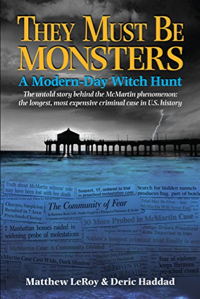Rascals case in brief
In the beginning, in 1989, more than 90 children at the Little Rascals Day Care Center in Edenton, North Carolina, accused a total of 20 adults with 429 instances of sexual abuse over a three-year period. It may have all begun with one parent’s complaint about punishment given her child.
Among the alleged perpetrators: the sheriff and mayor. But prosecutors would charge only Robin Byrum, Darlene Harris, Elizabeth “Betsy” Kelly, Robert “Bob” Kelly, Willard Scott Privott, Shelley Stone and Dawn Wilson – the Edenton 7.
Along with sodomy and beatings, allegations included a baby killed with a handgun, a child being hung upside down from a tree and being set on fire and countless other fantastic incidents involving spaceships, hot air balloons, pirate ships and trained sharks.
By the time prosecutors dropped the last charges in 1997, Little Rascals had become North Carolina’s longest and most costly criminal trial. Prosecutors kept defendants jailed in hopes at least one would turn against their supposed co-conspirators. Remarkably, none did. Another shameful record: Five defendants had to wait longer to face their accusers in court than anyone else in North Carolina history.
Between 1991 and 1997, Ofra Bikel produced three extraordinary episodes on the Little Rascals case for the PBS series “Frontline.” Although “Innocence Lost” did not deter prosecutors, it exposed their tactics and fostered nationwide skepticism and dismay.
With each passing year, the absurdity of the Little Rascals charges has become more obvious. But no admission of error has ever come from prosecutors, police, interviewers or parents. This site is devoted to the issues raised by this case.
On Facebook
Click for earlier Facebook posts archived on this site
Click to go to
Today’s random selection from the Little Rascals Day Care archives….
Click for earlier Facebook posts archived on this site
Click to go to
Today’s random selection from the Little Rascals Day Care archives….
At center of case: disgruntled mom, newly indoctrinated policewoman

PBS.org
Jane Mabry
Aug. 21, 2017
“It’s impossible to say what might have happened had Jane Mabry’s child not been slapped, or if Brenda Toppin had not just been to the sexual abuse class. I certainly don’t think Jane ever foresaw where it all led. Who could? I think all she wanted was to close Little Rascals.”
– Ofra Bikel, quoted in “A ‘Frontline’ documentary on child abuse hysteria shows how good TV can be” by Brian Lambert in the Saint Paul Pioneer Press (May 27, 1997)
![]()
‘If somebody killed a rabbit at my day care…’
April 12, 2013
In January 1993, supporters of the Edenton Seven held a press conference in Hertford to demand that North Carolina authorities bring to an end – in the words of Raymond Lawrence – “this continuing social catastrophe.”
Also speaking out were Doug Wiik of Langhorne, Pa., a day care owner who survived a close call with the mania, and Susan Corbett, director of a day care in Richmond, Va.
Ms. Corbett’s contribution also included weekly letters to Dawn Wilson while she was imprisoned and gifts for her baby at Easter.
Now retired, Ms. Corbett says she recognized immediately that the Little Rascals charges were preposterous: “There was no question in my mind. If somebody killed a rabbit at my day care, everybody in town would know it in 24 hours.”
So why did so many others succumb?
“I think people uncomfortable with sexuality bought into it more easily. The Bible Belt, the right wing and a perverted, anti-sexual stage of feminism all came together…. And the world of social work was being sold a bill of goods at that time – all that crap with (anatomically correct) dolls.”
Dr. Summit was anything but objective about McMartin
Feb. 8, 2019
Second of two parts
At the core of the recent McMartin expose “They Must Be Monsters: A Modern-Day Witch Hunt” is the authors’ meticulous tracing of how the fantasies of one paranoid schizophrenic mother, Judy Johnson, fostered the longest and most expensive criminal trial in American history.
 But Johnson did not act alone. Toward the end of the book Matthew LeRoy and Deric Haddad recall interviewing psychiatrist Roland Summit in his office and confronting him with evidence that – contrary to his earlier denials — he had been deeply involved not only with supporting Johnson’s bizarre accusations but also with fostering them.
But Johnson did not act alone. Toward the end of the book Matthew LeRoy and Deric Haddad recall interviewing psychiatrist Roland Summit in his office and confronting him with evidence that – contrary to his earlier denials — he had been deeply involved not only with supporting Johnson’s bizarre accusations but also with fostering them.
I asked Haddad what lay behind Summit’s deceit.
“I suspect he was trying to cover up that he had given false testimony under oath,” he said. “He’d testified that they ‘first met’ in February 1984 – but Judy’s own calendars revealed a relationship that went back a year earlier. He may have had an influence on her before she ever even dropped her son off at McMartin.
“So when he looked over her notes, that only we had possession of, he saw that we could prove he’d lied. He got really shaky….”
If he had concerns about his professional reputation, Summit surely had much to be shaky about, including his role in whipping up panic among parents and his insistence that McMartin Preschool sat above a network of abuse-enabling secret tunnels.
![]()
For therapist, creating memory is easy task
 June 13, 2012
June 13, 2012
“Actually, making a false memory is pretty easy.
“(Psychologist Elizabeth) Loftus describes a father convincing his daughter she’d gotten lost in a mall when she was five years old. At first, the daughter denied any memory of the event, but as the father provided more fake details – ‘Don’t you remember that I told you we would meet at the Tug Boat?’ – the daughter began to ‘remember’ and even provide details of her own. Eventually when her father said, ‘I was so scared,’ she responded, ‘Not as scared as I was!’…
“You can probably imagine the implications of false memory in the courtroom or on the therapist’s couch (which famously leads to the courtroom)….”
– From “How You Remember, How You Decide: Memory Part II”
by Garth Sundem in Psychology Today (October 6, 2010)











0 CommentsComment on Facebook